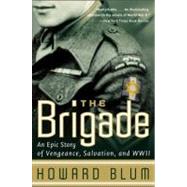
The New copy of this book will include any supplemental materials advertised. Please check the title of the book to determine if it should include any access cards, study guides, lab manuals, CDs, etc.
The Used, Rental and eBook copies of this book are not guaranteed to include any supplemental materials. Typically, only the book itself is included. This is true even if the title states it includes any access cards, study guides, lab manuals, CDs, etc.
The troops were singing. The Hebrew songs had broken out spontaneously when the trucks approached the docks in Alexandria and the men saw the cargo ships that would take them across the Mediterranean to Italy. As they marched up the gangplanks, their voices grew louder and more spirited. It was a bright Tuesday morning, the final day of October 1944, and at last the Jews from Palestine were going to war.
For the past three years, the volunteers in the three battalions that made up the British Palestine Infantry Regiment had spent their days doing monotonous guard duty in North Africa, chasing after goats stolen by mischievous Arab youths, and training in the hills north of Tel Aviv with outdated weapons. A world away the war in Europe had raged on. But just five weeks ago the three battalions had been ordered to Burg-el-Arab, a flat brushless stretch of desert between El Alamein and Alexandria, and had been swiftly re-formed and outfitted into the combat-ready Jewish Brigade Group.The historical significance of these soldiers preparing to go off to Europe with a golden Star of David on their blue shoulder patches was appreciated by the Brigade's new British commander. Brig. Ernest Frank Benjamin announced to his officers that "this is the first official Jewish fighting force since the fall of Judea to the Roman legions."But as the boats left the harbor, the men standing on the quarterdeck watched the Egyptian shore disappear and were excited by another knowledge. An army of Jews was finally on its way to confront an enemy that had set out to annihilate their people.Sgt. Israel Carmi did not go on deck with the others as the SS Stafford went to sea. He remained on guard by the bunks.He had been ordered by the Haganah to smuggle two men to Europe along with the troops. Days ago he had stolen two uniforms, and his wife had tailored them at the kibbutz so that the impostors could march up the gangplank unnoticed with the rest of the soldiers.But Carmi knew the two would never be able to fool a British officer. So he stayed with them as they lay on their bunks. He would try to intervene before anyone could become suspicious. He was prepared, though, to do whatever was necessary to ensure that the two stowaways arrived in Europe. Carmi was a sergeant in the British army, but his allegiance was to the Haganah and the land, the eretz, he was leaving behind.That night, Capt. Johanan Peltz could not sleep. He went up to the deck and walked over to the rail. The moon was high in the sky and illuminated the sea with a silver sheen. The shoreline had receded from sight, and he was full of anticipation. He had spent seven years in this primitive, overbearingly hot part of the world, and he was glad to be leaving.It felt blasphemous to be happy in these grim times, but he could not help being filled with a sense of joy as he imagined returning to Zabiec, his family's estate in Poland, once the war was over. In his mind it was all very clear. He would ride in a carriage through the allée of chestnut trees to the front door of the big brick house. It would be the dinner hour, everyone certain to be home. He would walk up the wide stone steps and when the maid answered the door he would tell her not to announce him. Then he would stride across the checkerboard floor of the main hall, tall and erect in his British officer's uniform, and into the dining room, while his parents and grandfather, proud and elated, rushed from the table to greet the returning hero.Lt. Arie Pinchuk was in the radio room playing bridge. He, too, could not sleep. His stomach bubbled nervously. He was an officer in the Jewish Brigade, but he was traveling to Europe on his own private, and very vital, mission.He could not concentrate on the cards, either. He was thinking about what he would need to do, all the obstacles he would face. And from the depths of his own internal hell, he was silently demanding, Mama, Papa, Leah, what has become of you?It was nearly three A.M. when Pinchuk returned to his bunk, and by then the Stafford was rolling violently. The ship had headed into a storm. Waves crashed against the bow, and the swells surged over the deck. The winds were shearing. Yet the convoy continued on. All the men could do was hope the rough weather would soon improve.The Brigade
Excerpted from The Brigade: An Epic Story of Vengeance, Salvation, and WWII by Howard Blum, Hardscrabble Entertainment Staff
All rights reserved by the original copyright owners. Excerpts are provided for display purposes only and may not be reproduced, reprinted or distributed without the written permission of the publisher.